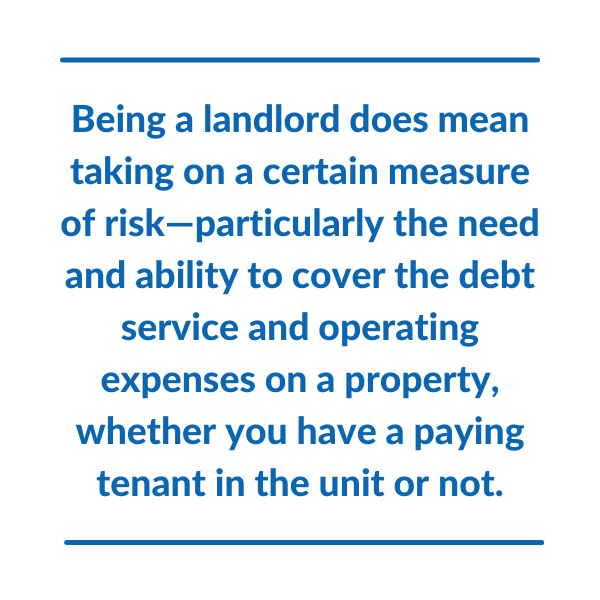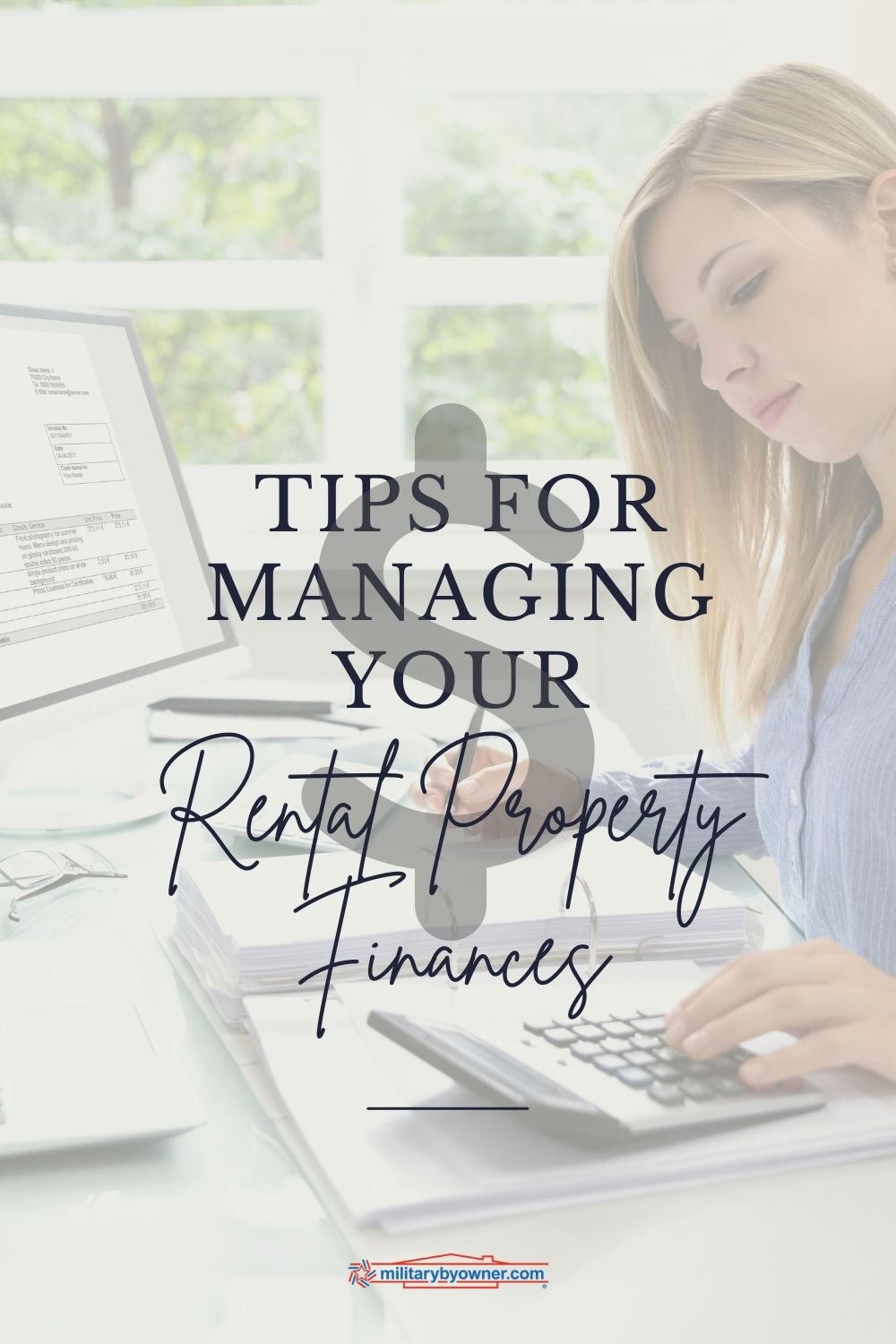
Photo from Canva
What you'll learn in this article:
Whether you have one rental property or a few, self-manage or have a property manager, at the heart of every successful rental venture is effectively managing the finances for your property.
If the thought of finances seems a bit overwhelming, here are a few tips guaranteed to get you on the right track!
Separate Your Financial Accounts
If it is your first time out of the gate as a landlord, it is critical that you set up at least two additional banking accounts that are to be used solely for your rental property.
Checking Account
Managing finances for your rental becomes infinitely more manageable with dedicated financial accounts. Additionally, if you elect to set up a business structure to hold your rental property, such as an LLC, you must separate business finances from your personal accounts. Failure to do so creates an undesirable situation called "co-mingling funds," when personal and business funds are mixed in the same accounts.
Co-mingling funds is also a sure-fire way to "pierce your corporate veil" and eliminate any asset protection you may have had in place with a business structure.
No matter if you self-manage or hire a professional property manager, you do need to open at least one checking account dedicated solely to your rental property to both receive income and pay expenses through.

Photo from Canva
Savings Account
A dedicated savings account for your rental property is useful for two reasons. One, if you self-manage your property, most state landlord/tenant laws require that tenant security deposits are maintained in a separate, and dedicated, savings account. Some states also mandate that landlords track and return any interest earned from the tenant's security deposit. As a practical operation, this also ensures you do not accidentally spend the deposit.
Tracking Rental Income
Tracking rental income is fairly straightforward, as your primary source of income is usually just gross rents. Other sources of property income could include: a monthly pet rent; a monthly fee to rent a parking, storage, or garage space; or possibly laundry income from coin-operated machines on site.
Accurately tracking income is a necessity, not only to create your own budget for your property. Rental income is also reportable income that is subject to federal and state taxation, and must be accurately declared.
Start here: A Guide for the Unexpected Military Landlord
back to top
Tracking Rental Expenses
When a financial plan goes off the rails, it is almost always due to a failure of accurately tracking, capturing, or budgeting for rental expenses. Unlike rental income, there are actually several categories of expenses for a typical rental.

Operating Expenses vs. Capital Expenses: What's the Difference?
In the eyes of the IRS, not all rental expenses are created equal, particularly when it comes to ordinary repairs versus Capital Expenses. This is because an "ordinary repair" (or Operating Expense) is fully deducted as an expense in the year it was incurred.
But a Capital Expense is a repair that "has a useful life", so its cost is deducted over a number of years.
- A Capital Expense, or CapEx, is a repair that enhances the "life," or longevity, of the property. Roofs, gutters, new flooring, cabinetry, or appliances, adding storm doors or enhanced windows to a property, a new vanity or toilet, are all examples of Capital Expenses.
- Some of the most common Operating Expenses include: utilities (electric, water, trash, sewer), repairs (that are not considered CapEx), maintenance, landscaping, lawn care/snow removal, advertising, legal and tax services (as needed), and potential HOA (Homeowners Association) dues. Examples of ordinary repairs could include: unclogging a toilet or garbage disposal, replacing knobs or hoses, fixing a broken tile or two (vs. replacing an entire floor with tile). Property taxes, mortgage insurance, and property insurance are also typically considered operating expenses, whereas the actual mortgage is considered "debt servicing."
Pro tip: One of the key metrics in measuring the financial viability of your rental investment is Cash Flow. Cash Flow can be either positive (i.e. money left over, after all expenses are paid) or negative cash flow, where the property is not generating enough income to pay for its expenses.
Cash flow is determined by taking:
Gross income
- Operating Expenses
= Net Operating Income (frequently referred to as NOI)
NOI
- Debt Servicing
= Cash flow (positive, or negative)
Tax Tip: In preparation for tax season, you will need to obtain the Tax Assessor statement for your rental property. Some jurisdictions mail these statements out, while others are online.
Property tax records are easily found via a web search and are public information; simply search for your County's Tax Assessor Office and Property Look-up. Aside from knowing how your property taxes are levied as a rental owner, you can now take advantage of Depreciation, one of the biggest perks of real estate.

Photo from Canva
The IRS allows rental property owners to take a depreciation allowance, which in turn reduces your overall taxable income.
But there's a catch. Only "real property" can be depreciated; land cannot. So you'll need to deduct land from the equation, when it comes to correctly accounting for depreciation. The land value for your parcel is found via the Tax Assessor statements.
If this all sounds as clear as mud right now, your key takeaways are these:
1) Accurately track how much money came in.
2) Accurately track how much money went out, via documented expenses and repairs.
3) The cost of hiring a reputable CPA or bookkeeper is worth it, not only for your peace of mind to assist in tax preparations and maximize your tax deductions. A CPA or bookkeeper can also assist in capturing monthly expenses and income.
Putting Systems in Place
Whether you self-manage or hire a professional manager, tracking your rental finances becomes much easier with good systems in place.
If you elect to self-manage, there are actually several software options for landlords that capture both tenant screening and finance tracking— to include accepting rental payments. TenantCloud, Yardi (Breeze), and Quickbooks are frequently recommended due to price structures. A simple Excel sheet can also work, where Income and Expenses are listed in adjoining columns as the info comes in.

Photo from Canva
Pro tip: Make both your life and your accountant's life a breeze with Google Drive. Create a file for financial documents (such as Tax Assessor statements), expense receipts and bills in Google Drive, add your finance-tracking spreadsheet, then simply share access with your tax professional.
If you decide to have your property professionally managed, ask what accounting software the PM (Property Manager) uses to track your income and expenses. AppFolio, Buildium, and Yardi are among the most popular programs, but there are many good programs. I would recommend adding your PM's financial statements monthly to your Google folder.

Budgeting for Maintenance and Repairs
A good rule of thumb is to set aside at least ten percent of your gross rental income in savings to eventually use for repairs.
You will never regret having too much in savings for a rental property.

Photo from Canva
Personally, we now aim to have at least six-months’ worth of mortgage payments set aside to use for repairs, and if needed, to have a cash cushion if tenants fall behind on rent. Being a landlord does mean taking on a certain measure of risk—particularly the need and ability to cover the debt service and operating expenses on a property, whether you have a paying tenant in the unit or not.
Budgeting will also depend on the property's current condition. Frequent inspections (at least yearly) are highly recommended to make a budgeting forecast for upcoming repairs. Maintenance and repairs may be seasonal as well, depending on where the home is located. Or if you know the home is facing a tenant turnover, you may be looking at fresh carpet, paint, or perhaps even extensive damages.

back to top
Watch Out for These Financial Pitfalls
We've had the unfortunate luck to learn several lessons the hard way. Here are some tips, so maybe you don't have to.
Property Managers are not created equal, and there are some real stinkers out there. Before you sign a management agreement, ask for samples of financial reports, and ask the PM to explain line items. If the PM gets testy or shows any whiffs of impatience, keep searching. A PM should be able to clearly explain your property's financials, without making you feel uncomfortable or dense. Additionally, scour Google reviews for the company and the agents (in most states, property managers must also be licensed real estate agents).

Photo from Canva
Know, or learn, what average repair costs run for your locality. Get several work quotes, and insist that the company send you photos of their completed work before payment.
For a larger job, such as painting, it is typical to pay a materials cost – then the full project cost once the work is complete. Never pay in full for construction work that has not yet been completed:
1) There is no incentive for a worker to complete the job, and
2) An unscrupulous company can easily skip town, with your hard-earned cash in hand. A reputable contractor will never insist upon full payment before work is complete.
Just as there are rotten property managers, there are also some truly rotten tenants out there. Screen carefully, and act quickly to evict a tenant, if needed.
- Never rent to friends or family. The old adage is true: money and family do not mix.
- Have the courage to admit what you don't know. If you hire a CPA or attorney, and they are talking circles over your head—remember, this is your investment. Not theirs. Ask them to "teach this to me like I am a five-year-old," and to be honest, if they get snarky—fire them. (We've fired three CPA's, four attorneys, and two property management companies).
Real estate truly can be one of the greatest ways to build long-term wealth. You do need to invest a little time to put a financial system in place, but the rewards are well worth it.
Want more useful information like this? Subscribe to MilitaryByOwner's newsletter to stay updated on current information about the real estate market, the latest on military life, special offers, and more!
By Kristi Adams
.jpg)

back to top